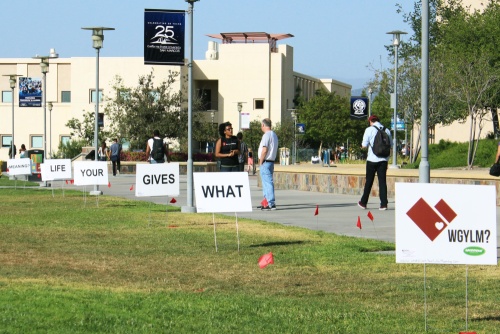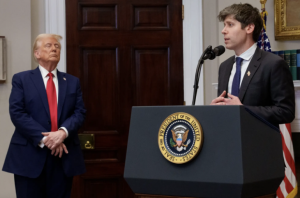Palliative Care campaign asks students “What Gives Your Life Meaning?”

April 21, 2015
[author title=”About the Author” author_id=”255″]
The California State University (CSU) Institute for Palliative Care recently launched a new campaign that will explore the importance of end-of-life care and educate students on issues that may affect themselves or their family members in the future.
The What Gives Your Life Meaning? (WGYLM) campaign is a way to educate students, as well, as community members, about the impact that palliative care makes on a person’s life. The campaign was officially launched on April 14 with the first event of the series, an educational session and lecture given by Dr. Katherine Pettus, an Advocacy Officer for the International Association for Hospice and Palliative Care.
“Palliative Care is a multidisciplinary team approach and it deals with addressing the pain and symptoms of life limiting illness, but it does not attempt to cure. It’s about managing all aspects of pain and symptoms including physical, social, emotional, spiritual and existential pain,” Dr. Pettus said.
The Palliative Care approach is centered around the comfort of a patient who is diagnosed with a life-threatening condition and follows the patient, as well as their family, through the course of the illness.
“What makes Palliative Care distinct from the usual biomedical model is that the unit of care is both the patient and family as well as the palliative care team. So, it creates an extra layer of care through life-limiting and life-threatening illness,” Dr. Pettus said. “Palliative care manages and accompanies patients and their families through the complexity of these illnesses.”
During her presentation, Dr. Pettus discussed the importance of having conversations about death and creating a relationship with a patient so that they can experience as little pain as possible throughout their illness.
“Most Americans say that they want to die at home, with their family and in comfort, and yet only 24 percent of Americans older than 65 die at home. 63 percent die at hospitals or nursing homes, tethered to machines, and most of them are in pain,” she said.
“This is the gap between the conversation that needs to be had about how you want to die, where you want to do die and in what context, and how people are actually dying. This is the gap that palliative care is trying to bridge.”
Dr. Pettus also discussed her claims about why these conversations aren’t happening and what Palliative Care can do to resolve these issues.
“The reason we don’t have those conversations is because people don’t want to talk about dying. America is a young, immortal, individualistic and driven country, and death is seen as a failure,” said Dr. Pettus.
CSUSM has been the home of the CSU Institute for Palliative Care since it started in the fall of 2012. The CSU Institute is a statewide initiative with a goal that aims to educate students and community members, as well as current and future health care professionals. The Institute offers professional classes to any healthcare professional looking to grow within the Palliative Care field, and also offers classes for family members and loved ones. The purpose of this is to make sure that patients who are living with a chronic illness are being given the opportunity to use Palliative Care.
The WGYLM campaign is an all-inclusive drive to develop a comprehensive understanding of Palliative Care amongst the community.
In the remaining days of April, the CSU Institute for Palliative Care will continue with this campaign and will host several more events that they encourage students and community members to attend.
From 11:30 a.m. to 1 p.m. on Thursday, April 23 in front of the USU, there will be a WGYLM Resource Fair and Public Art Project event that will allow students, faculty and staff to portray their own reflection of what gives life meaning for them. The resource fair will consist of 22 agencies who will present on Palliative Care through different topics.
Additionally, at 5:30 p.m. on Thursday, April 23 at the McMahan House, the Institute will host a free film screening of “Finding Joe”, a movie that also reflects the issues and themes within the WGYLM campaign. Ice cream will also be served for anyone attending this event.
Lastly, the WGYLM series will end with “My Voice, My Choice” from 12 p.m. to 12:50 p.m. on Tuesday, April 28 in Academic Hall 102. Speaker and RN, Caroline Boaz, will discuss the significance for students to understand what is important to them when it comes to the end of their lives through the introduction of Advanced Directives, which are legal documents that allow individuals to clearly plan their decisions about end-of-life care ahead of time.
“When there is an illness in the family, it’s a family affair. It’s not just about the person who has the illness. Knowing about the resources that are available and knowing about your options is vital. It’s also important for students to be educated about palliative care because illness can strike anybody at any time,” said Dr. Sharon Hamill, Professor of Psychology and the CSU Institute’s Faculty Director for the CSUSM campus.
For more information on the What Gives Your Life Meaning? campaign or to learn more about these events, please visit whatgivesyourlifemeaning.com.






Ian Dibb • Apr 29, 2015 at 11:08 am
What a superb article. End of life planning is something we are passionate about changing at http://www.onceivegone.com. We are finding that people want to talk about death, but their children, and grandchildren don’t want to discuss the subject. A change in thinking is needed.
Jonathan D. Lopez • Apr 27, 2015 at 12:08 pm
It’s great to see fellow college students talking about this. We (The GRCC Collegiate) just wrapped up our special project for the semester “How do you live your best life?” We partnered with Hospice of Michigan and interviewed patients and staff. It changed the way I look at life as well as death.
Kirsten Pruzek • Apr 26, 2015 at 10:21 am
I think this is fabulous and long overdue.
Like many/most Americans, I don’t relish conversation about death. For myself, primarily because of fear of the pain involved.
However I’ve had to face my fears during the past few years through the process of being considered as a living liver donor to my father, having a will created to protect my daughter, and watching the pain and suffering my father endured in the 16 months he waited before he successfully received a liver / kidney transplant.
He was certainly one of the lucky ones, and so many people die while waiting for an organ transplant. There were many times before he received his new organs that he almost died, however.
My sister-in-law’s mother just passed away from colon cancer. Although she had hospice care and was at home with family at the end, she experienced a great deal of pain and suffering, some of which that could possibly have been avoided, or reduced. Our country is in tremendous denial regarding the death and dying experience, and we owe it to our loved ones to learn more in order to decrease the additional suffering so many people endure as a result of the denial.
James Kershaw • Apr 25, 2015 at 11:22 am
Palliative care is a wonderful thing when individuals have the opportunity the partake. When it comes at the right time, the quality of its care can be most satisfying. if I need it some day I hope it is available.
Sunil Aggarwal, MD, PhD • Apr 25, 2015 at 5:12 am
Excellent article!
Sherry Hall • Apr 25, 2015 at 4:20 am
This idea for educating the community — all of the community — is wonderful! I would love to do something similar in my area.